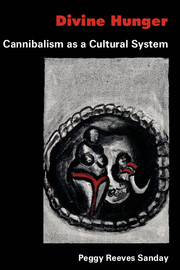2 - Analytic framework
Published online by Cambridge University Press: 05 June 2012
Summary
[I]nsist as we may upon the distinct character of cultural action, we are invariably forced to the conclusion that the cultural, too, is merely a part of nature. Whatever we do, we do as warmblooded, mammalian animals, exemplifying natural effect in all of our actions. In our own terms, then, culture is nature harnessing nature, understanding nature, and coming to know itself.
This chapter introduces the conceptual framework that guides the analysis and presentation of data in the following chapters. Fifteen case studies provide the material for the more detailed discussion. These case studies are identified in Table 6 by the name and location of the society; and by whether cannibalism is social (that is, under the control of group decisions) or is antisocial (that is, outside group control). Table 6 also identifies the type of data on which my analysis is based, the type of cannibalism practiced, and the chapters that treat the case studies in more detail.
The fifteen cases were chosen because of the reliability and detailed nature of the data. Some are drawn from the fieldwork conducted by ethnographers in the past decade. In one case, that of the Bimin-Kuskusmin, instances of mortuary cannibalism were observed by the ethnographer. In three cases (the Hua, Gimi, and Goodenough Islanders), the ethnographer provides detailed information on the practice of cannibalism, as reported by informants, before it was prohibited by government and missionary officials.
- Type
- Chapter
- Information
- Divine HungerCannibalism as a Cultural System, pp. 27 - 56Publisher: Cambridge University PressPrint publication year: 1986



